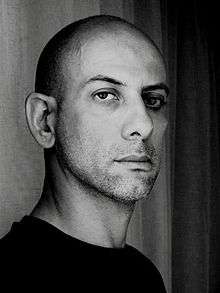Salar Abdoh
| Salar Abdoh | |
|---|---|
 | |
| Born | Tehran, Iran |
Salar Abdoh is an Iranian American novelist and essayist. He is the author of the novels The Poet Game (2000), Opium (2004), Tehran At Twilight (2014), and the editor and translator of the anthology Tehran Noir (2014). He is also a director of the graduate program in Creative Writing at the City College of New York at the City University of New York.
Early life
Salar Abdoh was born in Iran and also spent some time in England. When Abdoh was fourteen his family was forced to leave Iran for the US. Abdoh earned an undergraduate degree from U.C. Berkeley and received a Master’s from the City College of New York.
Career
Abdoh’s first novel, The Poet Game, focuses on a young agent sent by a top-secret Iranian government agency to infiltrate a group of Islamic extremists in New York in order to keep them from acts of terror that might draw the US into a war in the Middle East.[1] Though the book was published in 2000, it received far greater attention following the September 11, 2001 attack on the World Trade Center.[2] His second novel, Opium (2004) tells the story of a young American who used to work as a drug-runner along the Afghan/Iran border during the Soviet occupation of Afghanistan. Years later, living in New York and trying to keep a low profile, his past suddenly catches up with him as the US is gearing up to invade Afghanistan and Iraq. Abdoh has also published short stories and essays on war and politics in numerous journals; in 2010 he edited Callaloo Journal's issue of Middle East and North Africa writers. For his prose he has won the New York Foundation for the Arts award in 2008 and the National Endowment for the Arts award in 2010.
Abdoh also co-wrote the play Quotations from a Ruined City with his older brother, Reza Abdoh, the world famous avant-garde theater director. The play was first produced in 1994.[4]
Works
Abdoh, Salar. Opium. London: Faber and Faber, 2004. Print.
Abdoh, Salar. “Re: Research Project.” Message to Colleen Adler. 3 April. 2012. E-mail.
“Iran Hostage Crisis.” New World Encyclopedia. NewWorldEncyclopedia.org. June 2007. Web. 3 April 2012.
“Iranian Revolution-Definition”. World iQ. worldiq.com. 2010. Web. 23 April 2012.
“Iranian Revolution.” Wikipedia. Wikipedia.com. nd. Web. 2 April 2012.
“Islam.” International Encyclopedia of the Social Sciences. 1968. Encyclopedia.com. 27 Mar. 2012. <http://www.encyclopedia.com>.
“Middle East-Iran.” Central Intelligence Agency. The World Fact Book, 26 Mar. 2012. Web. 27 Mar. 2012.
“Salar Abdoh.” Association of Iranian American Writers. iranianamericanwriters.org. 2004. Web. 3 April. 2012.
“Salar Abdoh.” Faber and Faber. Faber.co.uk. n.d. Web. 21 April 2012.
“Salar Abdoh.” Wikipedia. Wikipedia.com, n.d. 27 Mar. 2012.
Shahrzad Arshadi. 1980s Massacre. 2008. Web. 27 Mar. 2012.
References
- ↑ Harlan, Megan (2001). The New York Times Book Reviews 2000. Taylor & Francis. p. 358. ISBN 1-57958-058-0. Retrieved 2008-06-25.
- ↑ Cowart, David (2006). Trailing Clouds: Immigrant Fiction in Contemporary America. Cornell University Press. p. 110. ISBN 0-8014-7287-3. Retrieved 2008-06-25.
- ↑ Guttridge, Peter (2004-07-25). "It was hell being a travelling salesman in the Old West". The Guardian. London. Retrieved 2008-06-25.
- ↑ Schneider, Rebecca; Cody, Gabrielle H. (2001). Re:direction: A Theoretical and Practical Guide. Routledge. p. 178. ISBN 0-415-21390-8. Retrieved 2008-06-25.
External links
- Author statement on the writing of Tehran At Twilight
- Salar Abdoh's introduction to the Tehran Noir anthology: The Seismic City
- An Article by Salar Abdoh about a public execution in Tehran
- Salar Abdoh about covering the 'War on Drugs' in Afghanistan
- Fiction by Salar Abdoh about the Iran-Iraq War
- Salar Abdoh on Majed Neisi about the Afghan civil war
- Salar Abdoh on the 2009 demonstrations in Tehran
- Fiction by Salar Abdoh in Tremors-Anthology of Iranian-American Fiction, Asia Society, 2013
- Faber & Faber author page
- Interview
- Excerpt from The Poet Game
- Essay on September 11
- Three part series of articles on Iran:
- NEA Writer's Corner Writer's Statement